As I (Robert) begin this newsletter, I am picturing New England’s spectacular autumn foliage. The leaves should presently be near or at their peak and I understand this year’s colors are expected to be brilliant. Given that trees are rare here on Peru’s coast and there is very little green, color me envious. I’m also imagining brisk sunny days and chilly nights, tart, crisp Macintosh apples and the annual chore of raking leaves. Jealousy notwithstanding, Becky and I hope you are well and that this letter finds you delighting in God’s beautiful creation.
It is Tuesday morning and Becky and I are overseeing more construction at Casa de Fe, our church plant in Chincha. A few weeks ago we had work done on the church façade and had some sand left over.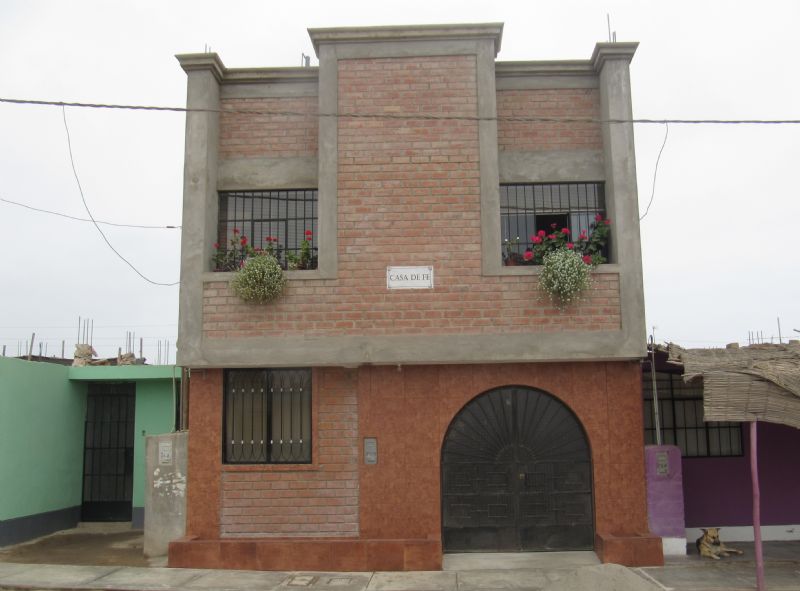
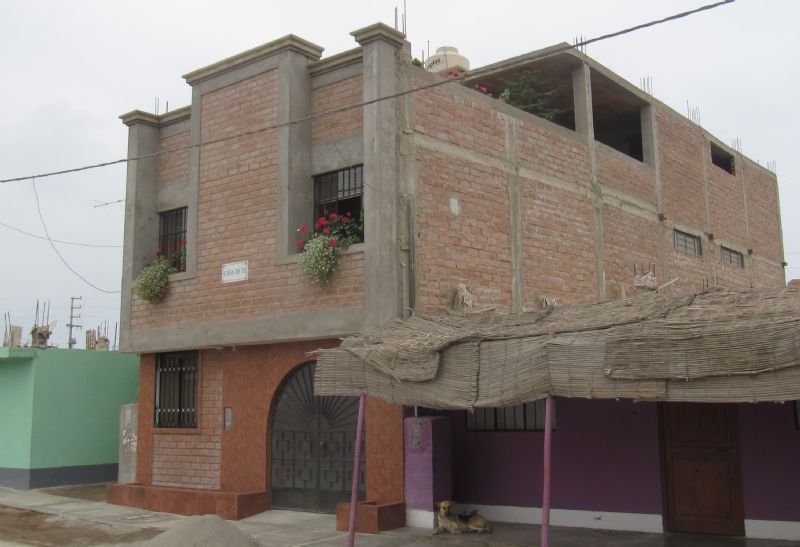
If you leave a pile of sand outside, it’s a magnet for the kids and the dogs (which are abundant in this community). I will simply add that dogs relate to the sand the way cats do a litter box. So in order to conserve the left over sand, we decided to have stucco applied to some of the second floor interior church walls. Essentially we’re covering brick walls with a ¾-inch coating of cement. Doing this well is quite an art. Our guy is doing a great job.
I want to share a few stories as well as to do a little “reporting.” First, two stories…
MARIA
My first encounter with Maria was several months ago. She had ventured into the church and coloring drawings which depicted Bible stories was Becky’s way of building a relationship with the shy, 10 year-old girl. Becky discovered that day that Maria could not read nor could she write—not even her name.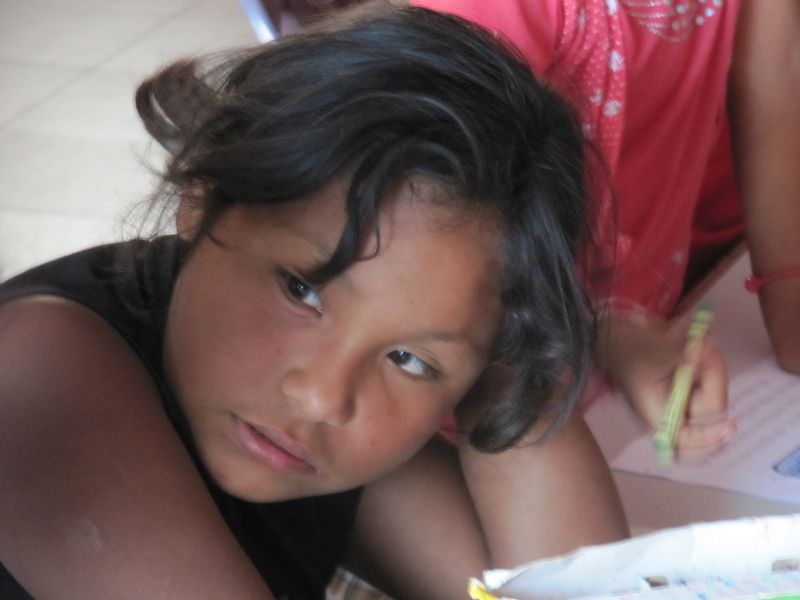
Through some conversations with people who live here we learned that Maria does not attend school. Her mother is an agricultural worker with several children and she works more than sixty hours each week. Maria has a 15 year-old sister who is already a mother. She fends for herself while her mother is at work. She will do some sweeping or help with laundry in return for some food. She has a bike and some younger kids who hang with her. Even though her mother apparently does not provide meals for her (at least during the day) Maria is not skinny—in fact she’s rather stout.
At this point the shyness is gone. When she sees us she puts her arms around us. She stops by the church multiple times in a day when we are here. Stating it diplomatically, she’s a very “resourceful” girl, always asking questions of us and others. She’s constantly on the hunt for things that might be of personal benefit.
Becky and two other women from the church recently went to speak with Maria’s mother. Their impression was that she was genuinely concerned for Maria’s well being. She says she wants Maria in school but has no way of compelling her, given her absence from the home for so many hours each day. It is clear that she sees no alternative to working in order to provide for her family. We could get the government involved, but based on what we’ve learned, that would likely be worse than the present situation for both Maria and her family.
Our sense is that one of the big impediments to Maria’s school attendance is embarrassment and shame. We would like to set up some regular tutoring to help her learn to read and write. However, identifying a tutor who is competent and willing to help as well as finding the resources to pay for the tutor are open questions at this point. Becky has purchased some books to help her.
The school year ends just before Christmas here in Peru (December is the beginning of summer) and commences again the first week of March. We’re not sure how much ground we can gain between now and then. In the mean while, in addition to her visits with us while we’re at the church, Maria spends a fair amount of her time with a family in the church (at least with the kids in the family) and comes to the church programs for children.
A key goal of our ministry is to help change the destinies of children in Nuevo Tambo de Mora (the specific community within Chincha where Casa de Fe is located). Maria is precious in God’s sight. She embodies both the need for long term investing in lives as well as the potential difference that investing in these precious souls can make.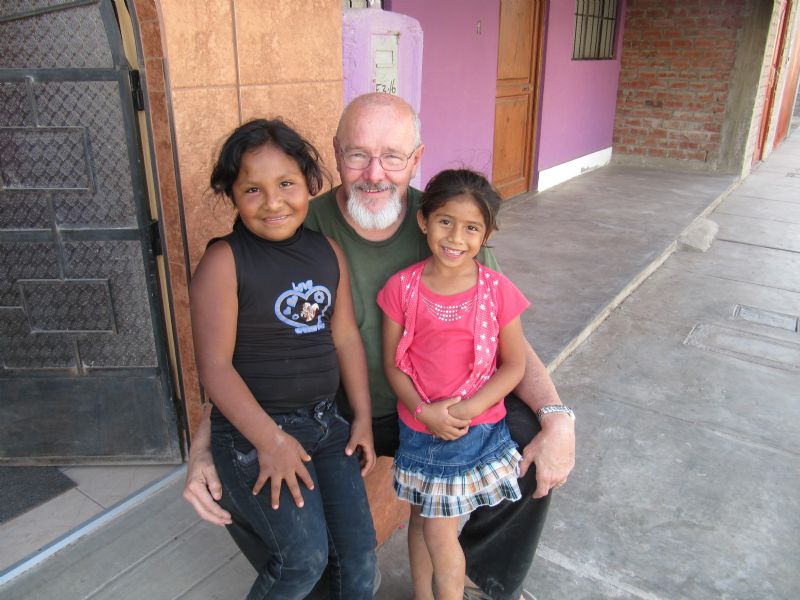
In my last letter I shared our dream of starting a Christian School. We would be blessed beyond words for there to be a refuge—a shelter teeming with God’s life, imparting God’s wisdom and transforming love—for the Maria’s of Nuevo Tambo de Mora. Right now it remains a dream. Please pray with us.
PASTOR CESAR
In the summer of 2010 our home church, Covenant Presbyterian in Simsbury, CT, sent a group of teens to minister with us in Tambo de Mora. One of the teachers at the local elementary school was the wife of a Pastor. We got to know Rocio during that project and later met her husband, Pastor Cesar. The following year we led another short term project with Pastor Cesar’s church and a group from a Baptist church based in Kentucky.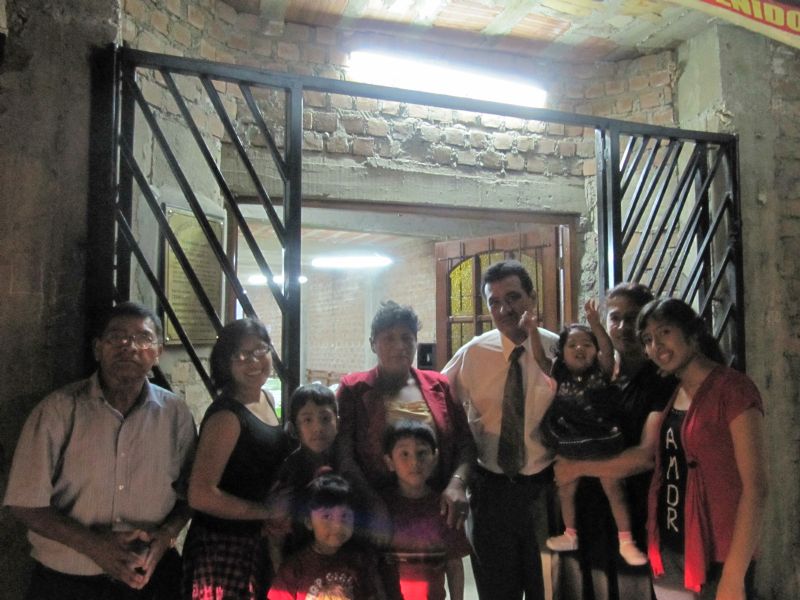
Over time we developed a close relationship with Pastor Cesar, Rocio and their four children who range in age from 5 to 19. In 2012 Pastor Cesar started experiencing serious health problems with symptoms you might associate with severe diabetes. He was eventually diagnosed with a rare blood disorder. He was in a hospital in Lima for more than two months last year.
There is a treatment involving an experimental drug that is manufactured by a pharmaceutical company in the U.S. I tried unsuccessfully to get this company to provide the medication on a humanitarian basis.
We observed Pastor Cesar’s rapid deterioration over the following months. We visited him in hospitals in Lima and Chincha and had several prayer sessions with the family in their home in Chincha. A month ago, when Becky was in Florida for training with Love Unveiled, I received a call from Pastor Cesar’s eldest daughter, Liset. She was crying and informed me that Pastor Cesar was in the hospital once again and that his condition was grave. I went to the hospital in Chincha to visit him the next morning.
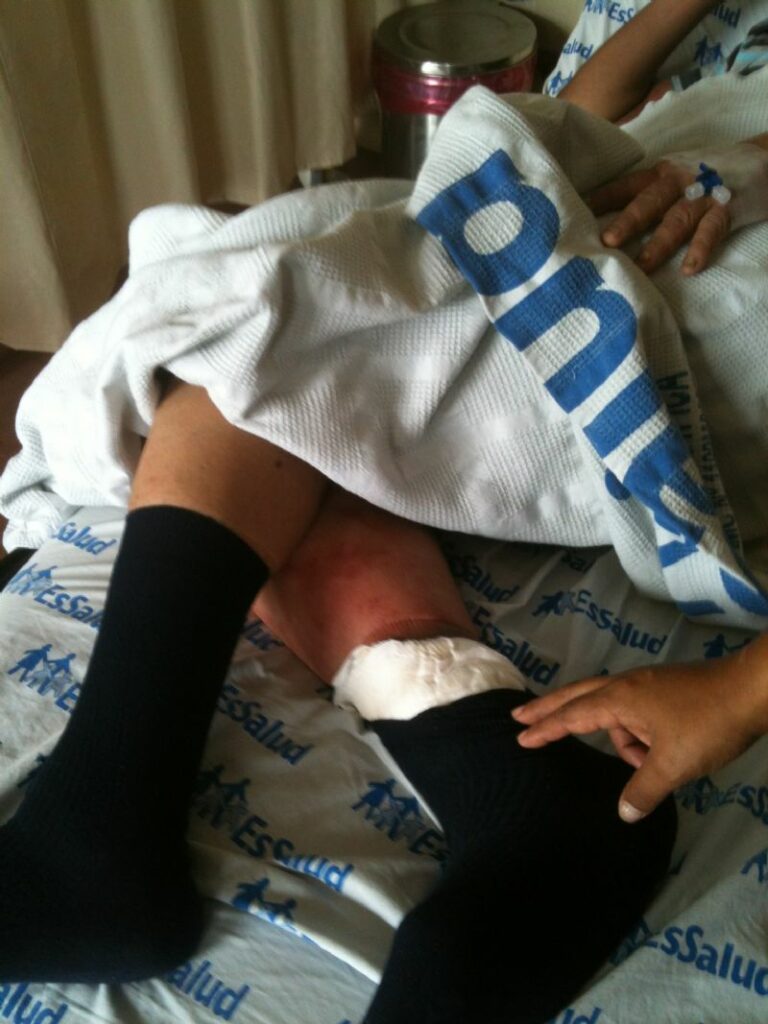
When I got into the room Pastor Cesar was in severe pain and could not get comfortable. The toes on his left foot were black and there were oozing sores on his lower leg that were wrapped in bandages. He was scheduled to have his leg amputated the following day. I briefly prayed with him while Rocio was doing all she could to make him comfortable. A nurse came in and replaced his intravenous pain medication. A short while later Pastor Cesar stiffened and his head tilted back. Although a doctor and a team of hospital staff worked to revive him for perhaps fifteen minutes, Pastor Cesar had passed into eternity. I am thankful that I was able to be with Rocio at the passing of her husband. I stayed with the family for the rest of the day.
Death is much less sanitized in Peru than it is in the U.S. For example, I was asked by an orderly at the hospital to help with Pastor Cesar’s body. Without getting explicit, I helped clean him up and helped get him onto a gurney. The body is taken to a holding room where it is later picked up by the mortuary. I helped remove the body from the gurney in that room as well.
The family is expected to put on the deceased’s burial clothes and they help load the body into the hearse. We helped remove his body at the funeral home (which is located directly across from the hospital) and were in the room while the mortuary staff prepared the body for burial. The burial itself normally happens within a day or two because the body is not embalmed the way it is in the U.S.
Typically the deceased person is transported to the family home for a wake and remains there overnight until the funeral the following day. The casket is frequently marched through the streets before the deceased is taken to the cemetery. Cemeteries in Latin America generally have above ground crypts where bodies are interred.
I will say plainly that most Americans have no idea how fortunate they are to have access to such high quality health care. The contrast is stark. Had Pastor Cesar lived in the U.S., I believe he would be alive today and his condition in the process of being managed. Healthcare in the U.S. is a blessing that most of us take for granted.
Please pray for Rocio and the four children as they move through this season of grief. You could pray for Pastor Cesar’s congregation and the future of the church which is located in central Chincha as well.
NEWS IN BULLET POINTS
In September Becky attended her sixth Butterfly Workshop training session (a discipleship program for women) in Orlando Florida 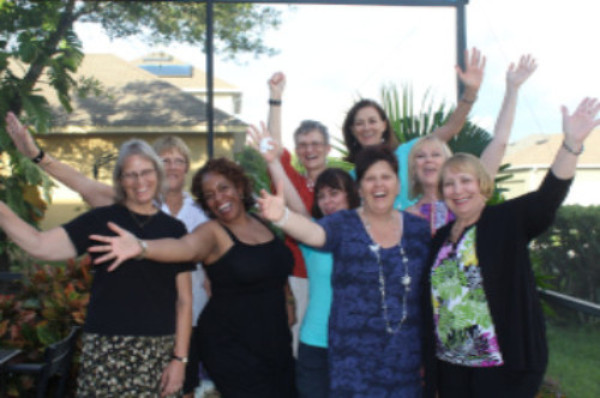
More families have become regular attenders at Casa de Fe.
We have found ourselves being asked to provide marital counseling as a result of a preaching series on biblical principles for family relationships
We recently had tiles installed on the church façade. Permanent planter boxes have been constructed and tiled as well.
We are grateful for reasonably good health. Robert’s heart remains in sinus rhythm and he has been consulting with a Peruvian cardiologist. Ricky, Kelsey and kids are well.
Kelsey and the family are looking forward to summer vacation as the school year nears its end and Kelsey’s teaching responsibilities conclude.
Daryl, Jennifer, Daniel and Hannah have moved into a new, larger home in Greenland, NH closer to Daryl’s work and near their church.








